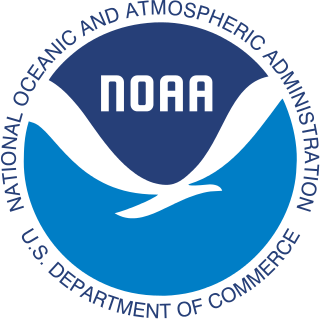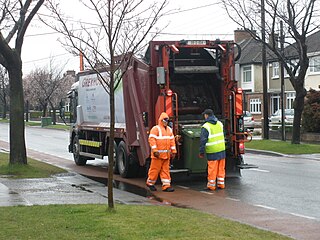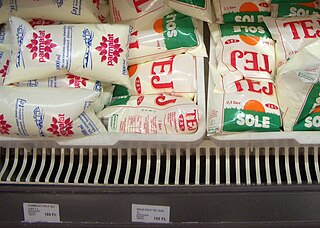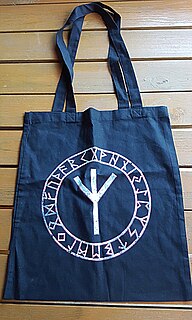Proposition 67 was a California ballot proposition on the November 8, 2016 ballot. A "Yes" vote was to approve, and a "No" vote to reject, a statute that prohibits grocery and other stores from providing customers single–use plastic or paper carryout bags but permits the sale of recycled paper bags and reusable bags for a fee. [1]

In California, a ballot proposition can be a referendum or an initiative measure that is submitted to the electorate for a direct decision or direct vote. If passed, it can alter one or more of the articles of the Constitution of California, one or more of the 29 California Codes, or another law in the California Statutes by clarifying current or adding statute(s) or removing current statute(s).

Plastic shopping bags, carrier bags, or plastic grocery bags are a type of plastic bag used as shopping bags and made from various kinds of plastic. In use by consumers worldwide since the 1960s, these bags are sometimes called single-use bags, referring to carrying items from a store to a home. However, reuse for storage or trash is common, and modern plastic shopping bags are increasingly recyclable or biodegradable. In recent decades, numerous countries have introduced legislation restricting the sale of plastic bags, in a bid to reduce littering and plastic pollution.
| Proposition 67 | ||||||||||||||||||||||
|---|---|---|---|---|---|---|---|---|---|---|---|---|---|---|---|---|---|---|---|---|---|---|
| Ban on Single-use plastic bags | ||||||||||||||||||||||
| ||||||||||||||||||||||
| Source: California Secretary of State [2] | ||||||||||||||||||||||
Proposition 67 passed with 53% of the vote. [2] With its passage, Senate Bill 270, which bans plastic shopping bags, was upheld and went into full effect. A related measure to allocate funds from plastic bag sales to environmental projects, Proposition 65, failed at the polls. [3]
Single-use plastic shopping bags are inexpensive to produce and effective for consumer use, and thus have taken over the market. These bags hold roughly an 80 percent share of the grocery and convenience store market since their introduction. According to a 2008 estimate in Waste Management, people around the world discard between 500 billion and 1 trillion plastic bags a year [4] .
The United States Environmental Protection Agency describes both the Pollution Prevention Act and the Resource Conservation and Recovery Act as establishing a nationwide objective for environmental protection. In detailing the wave of communities initiating bans on single-use plastic bags, the EPA cites the following rationale for limits on single-use plastic bags:

The Environmental Protection Agency (EPA) is an independent agency of the United States federal government for environmental protection. President Richard Nixon proposed the establishment of EPA on July 9, 1970 and it began operation on December 2, 1970, after Nixon signed an executive order. The order establishing the EPA was ratified by committee hearings in the House and Senate. The agency is led by its Administrator, who is appointed by the President and approved by Congress. The current Administrator is former Deputy Administrator Andrew R. Wheeler, who had been acting administrator since July 2018. The EPA is not a Cabinet department, but the Administrator is normally given cabinet rank.
Single-use plastic bags are considered to be a major contributor to the Great Pacific Garbage Patch, an area in the Pacific Ocean with high concentrations of litter and floating plastic by the National Oceanic and Atmospheric Administration. [6]

The Great Pacific garbage patch, also described as the Pacific trash vortex, is a gyre of marine debris particles in the north central Pacific Ocean. It is located roughly from 135°W to 155°W and 35°N to 42°N. The collection of plastic and floating trash, which comes primarily from countries in Asia, lies halfway between Hawaii and California and extends over an indeterminate area of widely varying range, depending on the degree of plastic concentration used to define it.

The National Oceanic and Atmospheric Administration is an American scientific agency within the United States Department of Commerce that focuses on the conditions of the oceans, major waterways, and the atmosphere.
Plastic is produced from petroleum, natural gas, and added chemicals, using large amounts of fossil fuel in production. Additionally, when plastic bags are disposed of in landfills, chemicals from this buried plastic are released into the surrounding environment and groundwater. National Geographic states that some of these chemicals, notably phthalates and bisphenol A, have been implicated as human health problems. [7]
Due to the environmental impact of plastic bags, numerous countries and cities around the world have implemented either taxes or bans on single-use plastic bags.
A more in-depth view at developments regarding limited use of plastic bags throughout the world can be found at Phase-out of lightweight plastic bags.
While legislation throughout the United States differs, the Environmental Protection Agency notes similarities across legislation that includes strict standard for replacement bags implemented at a fee. [5] Generally, replacement multi-use bags must be either recyclable or compostable. The bag must be built for extended use and have the ability to carry more weight than a standard, single-use bag. In many areas, plastic bag bans require retailers to charge a fee associated with providing reusable plastic bags to both cover the costs of providing heavier-duty bags and encourage consumers to provide their own bags. Multiple studies have been conducted to determine the most effective way to reduce consumer use of single-use plastic bags.
Cities within the United States have implemented both bans and fees to reduce the consumption of single-use plastic bags to varying degrees of effectiveness. San Jose, California banned plastic bags and saw an 89% decrease in the quantity of plastic bags found in the city's storm drains. On the other hand, Washington DC implemented a five-cent tax on bags that has led to a 60% reduction in bag usage. [16]

Tatiana Homonoff of Princeton University uses design-based research to estimate the effectiveness policies related to plastic bag usage in the United States. [17] She finds a large decline in plastic bag use immediately following the implementation of a five-cent tax on plastic bags. Additionally, Homonoff found that those who continued to use plastic bags used fewer bags per shopping trip following the tax. In contrast, a policy that offered consumers a five-cent bonus for reusable shopping bags had almost no effect on consumption of single-use shopping bags. This pattern is consistent with the economic model of loss aversion, and highlights the importance of financial incentives when designing policies directed to change consumer behavior. The graph to the left displays how a loss of $.05 has a larger magnitude shift to value than a gain of $.05. Consumers who are loss averse will respond better to a penalty of five cents for using a single-use plastic bag rather than five-cent reward for using a reusable bag.
Sidharth Muralidharan and Kim Sheehan determine penalties for single-use plastic bag consumption are only effective in the short term and assess methods to deter plastic bag use in the long run. [18] The authors explore consumer motivation by looking at how advertising messages framed as gains (avoiding a fee), losses (paying a tax) impact consumer behavior differently. Their findings demonstrate that a penalty framed as a tax may be more effective in motivating shoppers to bring reusable bags and to reduce consumption of single-use plastic bags.
Ritch, Brennan, and MacLeod argue that there are differences between regular consumer behaviors and those considered pro-environmental, thus complicating financial incentives with social expectations. [19] Use of reusable shopping bags instead of single-use plastic has a signaling effect from the consumer to be thoughtful and care about the environment. There is a certain amount of shame associated with using a single-use plastic bag provided general public knowledge on its problematic impact on the environment.
Erkan Arı and Veysel Yılmaz study the impact of consumer attitudes on consumption of plastic bags in Turkey [20] . The authors find that environmental consciousness and social pressure are factors in reducing consumption of plastic bags and causes for consumers to switch to reusable bags.
Per the State Constitution in California, new state laws may be placed before voters as a referendum to decided whether the law will go into effect. The state law at question was Senate Bill 270, approved by the Governor and filed with the Secretary of State on September 30, 2014. [21] The bill prohibits certain stores from providing customers with plastic single-use bags, and charges $0.10 for other types of bags. These requirements apply only in areas that did not already have single-use carryout bag laws at the time. At the same time, another proposition regarding plastic grocery bags was on the ballot. Proposition 65 was an initiative to use proceeds from plastic bag sales in grocery stores to fund environmental projects in California. [22] This initiative failed to pass, receiving 54.8% "No" votes. [23]
A "Yes" vote upholds Senate Bill 270. This prohibits certain retail and grocery stores from providing free, single-use, carryout bags to customers. Single-use plastic bags will be banned, and stores may sell reusable plastic or paper bags for a minimum of $0.10 per bag. [24] This law will only go into effect in areas without their own laws regarding single-use plastic bags.
A "No" vote rejects Senate Bill 270. Under this condition, stores in the State of California without city or county ordinances regarding single-use plastic bags will be free to continue to freely distribute such bags.
The Official Voter Information Guide states that the passing of this measure would have relatively small fiscal effects on both the state and local governments. [1] The measure could result in an increase of state costs to CalRecycle to ensure bag manufacturers meet new requirements. The measure may result in some cost saving to local governments in the form of reduced cleanup or waste management costs.
The measure prohibits grocery stores, convenience stores, pharmacies, and liquor stores from providing single-use, plastic, carryout bags. There are certain exceptions to this rule such as bags for unwrapped food products such as bulk produce or certain prescriptions.
In addition to banning single-use plastic bags, the measure permits the sale of reusable plastic bags as a replacement to single-use bags at a minimum fee of $0.10. This fee does not apply to certain low-income customers. The revenue generated from reusable bag sales is kept by individual stores. Under the provision, stores must use proceeds to cover the costs of providing carryout bags, complying with the new measure, and efforts to educate and encourage reusable bag usage. [25]
The measure creates new standards for the durability and material qualifications for reusable bags distributed at grocery stores, convenience stores, pharmacies, and liquor stores. The California Department of Resources Recovery is responsible for determining reusable bag requirements and ensuring bag manufacturers meet certification requirements. [26]
Those in favor of implementing Proposition 67 claim its passing will reduce litter, protect the ocean and wildlife, and reduce cleanup costs. Single-use plastic bags are one of the most common forms of litter and create environmental problems both on land and in water. An estimated 300 million plastic bags end up in the Atlantic Ocean [27] , creating problems for sea-life. Build up of plastic bags on land lead to drainage problems resulting in floods. Plastic bags on land are slow to decompose, thus posing a continued threat to wildlife unless dealt with through human intervention and clean up. Julie Packard, Executive Director of the Monterrey Bay Aquarium states: "Plastic bags harm wildlife everyday. Sea turtles, sea otters, seals, fish, and birds are tangled by plastic bags; some mistake the bags for food, fill their stomachs with plastics and die of starvation. YES on 67 is a common-sense solution to reduce plastic in our ocean, lakes and streams, and protect wildlife." [28]
Plastic bags are hard to recycle, as there is no disposal system implemented to successfully deal with their disposal. [27] It is expensive to effectively recycle the type of plastics used in single-use plastic bags, as these bags can clog recycling system equipment. It is up to local governments and recycling companies to decide whether the practice of recycling single-use plastic bags is allowed.
Voting "Yes" on Proposition 67 keeps in place a law passed by the California State Legislature and signed by the Governor that stops the distribution of single-use bags to consumers. Multiple cities and counties in California have similar laws implemented, and this unifies state law throughout California. At the time of the vote, 122 ordinances banning single-use plastic bags had been approved in the State of California governing 151 jurisdictions. [29]
Those in support of Proposition 67 highlight the environmental impacts of plastic bag usage and claim the opposition is composed of plastic bag companies from out of state. Committees formed primarily to fund and support this measure include:
| Individual Ballot Measure Committees Formed for this Measure [30] | |
| Committee Name | Total Reported Contributions |
| California vs. Big Plastic, Protect the Plastic Bag Ban, Sponsored by Environmental, Ocean Protection, Grocery Store, Reusable Bag Manufacturer, Business and Other Nonprofit Organizations | $857,690 |
| Californians Against Waste - Protect the Plastic Ban (Non-Profit 501 (C) (4)) | $85,121 |
| Committee to Protect the Plastic Bag Ban, Sponsored by the California Grocers Association (Non-Profit 501(c) 6): No on Proposition 67 | $238,550 |
| Save the Bag Ban, Sponsored by Environment California | $771,650 |
| Save the Bay Action Fund Committee to Support Proposition 67 | $99,375 |
| Save the Bay Action Fund PAC - Yes on Prop 67 | $3,600 |
Those in favor of plastic bags claim plastic bags are both cheap and hygienic. Plastic shopping bags can be used by consumers for multiple other uses, and therefore are not single-use as they are stated to be. Additionally, the implementation of a fee on reusable bags is an unnecessary burden to consumers that will be directed towards large stores instead of environmental efforts or projects with no oversight. Grocery stores profit off of consumers who are forced to pay a $.10 fee for each bag purchased.
Another concern regarding the ban of single-use plastic bags is the both the effectiveness and environmental impact of alternative replacements. Opponents to single-use plastic bag bans argue that multi-use bags are not environmentally friendly either. In A UK Environment Agency report on life cycle assessment of grocery bags, the authors find that with typical consumer behavior, the pollution-minimizing solution is to obtain single-use plastic grocery bags and reuse once for secondary tasks before disposing of bags. [31] The larger environmental impact of reusable bags paired with the consumer behavior of treating bags similar to single-use actually results in more harm than good towards the environment.
A number of large plastic companies support recycling plastic as opposed to a ban or reduction on its use. Committees formed primarily to fund the opposition to this measure include:
| Individual Ballot Measure Committees Formed for this Measure [30] | |
| Committee Name | Total Reported Contributions |
| American Progressive Bag Alliance, a Project of the Society of the Plastics Industry (Non-Profit 501 (c) (6)), Yes on 65 and No on 67 | $6,146,383 |

The American Chemistry Council (ACC), formerly known as the Manufacturing Chemists' Association and then as the Chemical Manufacturers' Association, is an industry trade association for American chemical companies, based in Washington, D.C.

A plastic bag, polybag, or pouch is a type of container made of thin, flexible, plastic film, nonwoven fabric, or plastic textile. Plastic bags are used for containing and transporting goods such as foods, produce, powders, ice, magazines, chemicals, and waste. It is a common form of packaging.

Shopping bags are medium-sized bags, typically around 10–20 litres in volume, that are used by shoppers to carry home their purchases. Some are intended as single-use disposable products, though people may reuse them for storage or as bin liners, etc.; others are designed as reusable shopping bags.

A blue bag is a blue coloured, sometimes semi-transparent bag for waste, mandated for use in some localities for refuse or for certain specific types of refuse: the distinguishing color serves to assist in recycling programs. Typically, it would be used for glass, plastic or polyethylene content.

A paper bag is a bag made of paper, usually kraft paper. Paper bags are commonly used as shopping bags, packaging, and sacks.

Waste minimisation is a set of processes and practices intended to reduce the amount of waste produced. By reducing or eliminating the generation of harmful and persistent wastes, waste minimisation supports efforts to promote a more sustainable society. Waste minimisation involves redesigning products and processes and/or changing societal patterns of consumption and production.

Rates of household recycling in Ireland have increased dramatically since the late 1990s. The Irish Environmental Protection Agency (EPA) is the agency with overall responsibility for environmental protection in the Republic of Ireland and monitors rates of recycling in Ireland along with other measures of environmental conditions in Ireland. The EPA, along with Repak, the principal organisation for packaging recycling in Ireland, report on recycling rates each year. In 2012 Ireland’s MSW recycling rate was 34%, while the rate of packaging recycling reached 79%. The amount of municipal waste generated per person per year in the Republic of Ireland has fallen significantly in recent years. This figure remains above the European Union annual municipal waste average of 503 kg per person however. Each local council in Ireland has considerable control over recycling, so recycling practices vary to some extent across the country. Most waste that is not recycled is disposed of in landfill sites.
Californians Against Waste is an environmental advocacy organization that advocates for stronger environmental laws and more recycling at the state and local level. The organization was founded in 1977 and has sponsored numerous successful citizen initiatives. It is headquartered two blocks from California's state capitol in Sacramento, CA.

Milk bags are plastic bags that contain milk. They are usually stored in a pitcher or jug with one of the corners cut off to allow for pouring. A typical milk bag contains approximately 1 L (1.8 imp pt) of milk in South America, Iran, Israel, Eastern Europe and the Baltics, while in the UK they contain 2 imperial pints (1.1 L), in Canada 1 1⁄3 litres (2.3 imp pt), and in India, 0.5 L (0.9 imp pt).
The American Progressive Bag Alliance (APBA) represents the U.S. plastic bag manufacturing and recycling industry, which employs nearly 25,000 workers in 40 states. Founded in 2005, the APBA lobbies against U.S. local and state plastic bag bans and taxes.

Tote bag is a large and often unfastened bag with parallel handles that emerge from the sides of its pouch. They are often used as reusable shopping bags.

A reusable shopping bag, sometimes called bag-for-life in the UK, is a type of shopping bag which can be reused many times. It is an alternative to single-use paper or plastic bags. It is often a tote bag made from fabric such as canvas, natural fibres such as Jute, woven synthetic fibers, or a thick plastic that is more durable than disposable plastic bags, allowing multiple use.

Bag It: Is Your Life Too Plastic? is a 2010 American documentary film exposing the effects of plastic bags and other plastic consumer merchandise, and its effects on land ecosystems, the marine environment and the human body.
Save the Plastic Bag Coalition v. City of Manhattan Beach is a California Supreme Court case, decided by a full majority on July 14, 2011, in which the plaintiffs challenged the City of Manhattan Beach's ordinance banning single-use plastic bags.
In the early 21st century, there has been a global movement towards the phase-out of lightweight plastic bags. Single-use plastic shopping bags, commonly made from low-density polyethylene (LDPE) plastic, have traditionally been given for free to customers by stores when purchasing goods: the bags have long been considered a convenient, cheap, and hygienic way of transporting items. Problems associated with plastic bags include use of non-renewable resources, difficulties during disposal, and environmental impacts. Concurrently with the reduction in lightweight plastic bags, shops have introduced reusable shopping bags.

Proposition 65 was a California ballot proposition on the November 8, 2016 ballot that would have redirected money collected by grocery and certain other retail stores through mandated sale of carryout bags, and required stores to deposit bag sale proceeds into a special fund to support specified environmental projects.

The phase-out of lightweight plastic bags in Australia is being pursued at local and state/territory level rather than nationally, with plastic bag bans implemented or pending in all states and territories except New South Wales. Environmental groups have expressed their concern that Australia was lagging other countries in the phase-out of lightweight plastic bags, including Botswana, Somalia and Tanzania. In 2016 it was estimated that of the 5 billion plastic bags used annually by Australians, 150 million ended up as litter.

The Hong Kong plastic shopping bag environmental levy scheme is an environmental levy scheme designed to reduce the manufacture and distribution of plastic shopping bags (PSBs) in Hong Kong. PSBs are made of materials that are not easily degradable. The extensive disposal of PSBs is putting stringent pressure on the very limited landfill capacity, thereby causing severe waste problems in Hong Kong.